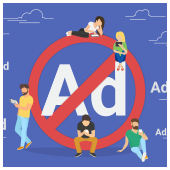
Who are getting these ads?
With ads being displayed in different parts of Windows 10 — the start menu, on the lock screen, from the taskbar, and in other Microsoft apps — overwhelming negative reactions to this Microsoft practice have been popping up online.
However, the company doesn’t consider them ads. They call it “suggestions.” These suggestions promote Microsoft products and services and third-party apps in the Windows Store. The tech giant may be doing users a favor by reminding them they can easily grab apps in the store that can benefit them. But to many, the presence of ads is less a favor and more a nuisance.
How do I turn them off?
Fortunately, there’s a simple way to turn them off. In fact, you could disable these ads right now by doing the following:
- Open your File Explorer.
- Select View from the ribbon along the top of any File Explorer window.
- Click Options on the far right hand side.
- From the drop down arrow below Options, select Change folder and search options.
- Once in the Folder options window, go to the View tab.
- In the Advanced Settings window pane, scroll down and deselect ‘Show sync provider notifications’.
- Click Apply and close the Folder Options window.
That’s all it takes! Keep in mind that we highly recommend the services Microsoft suggests. Office 365, OneDrive, and others are all great cloud platforms for safely working and collaborating from any device in any location — we just don’t want to see advertisements for them when we’re hunting down sales records.
If you’re looking for Windows tips and tricks, this is the best blog on the web. If you’re looking for something a little more robust however, our managed services are second to none. Get in touch with us today to learn more!